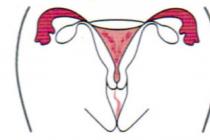A hard belly during pregnancy is a common occurrence observed in most women in position. Every expectant mother during the period of bearing a child is sensitive to her health, pays attention to every change in her condition. Often she has pain, heaviness in the abdomen, muscle tension. This raises concerns. After all, not every woman knows whether the stomach should be hard or soft during pregnancy.
The causes of a hard belly during pregnancy are physiological processes or pathological changes that occur in the body of the expectant mother. To understand why the stomach became hard during pregnancy, in a particular case, only a gynecologist can. A woman should visit him if the hardness persists for a day or more. Depending on the provoking factor, medical treatment may be required or only rest with the exclusion of any physical exertion will be enough.
A woman who has been diagnosed with such a diagnosis should not panic ahead of time. The causes of a hard uterus during pregnancy are well understood, the pathology can be successfully treated. The main thing is to contact a gynecologist in time and strictly adhere to all medical recommendations.
The physiological norm is the temporary appearance of hardness in the lower abdomen at any stage of pregnancy due to filling or overflow of the bladder. Its walls put pressure on the uterus, as a result of which its muscles tense up so that the fetus is not infringed. This condition, sometimes accompanied by moderate pain, is easily eliminated by emptying the bladder.
Other common causes:
- inflammation of the pelvic organs -, adnexitis,;
- urogenital infections, for example;
- physical overload;
- hormonal and endocrine disorders;
- release of oxytocin during stress, fear, orgasm;
- abnormal development of the uterus - underdevelopment, bend;
- a consequence of cardiovascular disease, exacerbated in a pregnant woman;
- problems with the intestines - flatulence, dysbacteriosis, colitis;
- disruption of the digestive tract;
- infections of a bacterial and viral nature - influenza, acute respiratory infections, colds;
- bad habits - alcohol addiction, smoking, drug addiction;
- a tumor in the abdominal cavity of a benign or malignant nature;
- long stay in one position, especially during sleep.
Why is a hard belly dangerous in early pregnancy?
The first weeks of gestation is a very important period during which the laying of organs and systems in the embryo takes place. A woman should have more rest, protect herself from stressful situations as much as possible, reduce physical activity, receive positive emotions from listening to music, walking in the fresh air.
If in the early stages of pregnancy the stomach becomes hard, more often this is associated with uterine hypertonicity. A woman with such a problem has a high risk of premature miscarriage, especially with the appearance of pulling pains in the lower abdomen and spotting. It is necessary to immediately contact a gynecologist, but it is better to call an ambulance. To eliminate the pathological condition, some require bed rest with the use of hormonal and sedatives, others require hospital treatment.

Another reason may be that some people experience after the 20th week of gestation. They are rare and do not occur regularly, usually with a break of 5-6 hours. This condition does not require treatment. More often it is enough to lie in a warm bath, take a walk in the fresh air or drink peppermint infusion.
Why is a hard belly dangerous in late pregnancy?
The abdomen hardens during pregnancy more often in the 3rd trimester, which is associated with the stirring of the grown fetus. Often there is tension in the muscles of the peritoneum in the place where the crumb rests from the inside with the leg.
If bloating appears, and it has hardened, then it is worth reviewing your diet, excluding food that causes fermentation in the intestines. These are grapes, black bread, green beans, cabbage, etc.
In late pregnancy, 2-3 weeks before delivery, the cause of a hard abdomen may be premonitory contractions. They are harmless, occur irregularly, do not dilate the cervix, last no longer than a minute, and go away on their own. So the uterus and the body are preparing for the upcoming birth.
If, during pregnancy, a hard abdomen is accompanied by pain that occurs at regular intervals, while they are shortened, and periods of muscle spasm increase, then, most likely, preterm labor has begun. You need to lie down and immediately call an ambulance.
A normal sign of pregnancy is abdominal firmness at 37-39 weeks, when the baby is considered full term. But the appearance of copious blood discharge should alert the woman, as this indicates the onset of placental abruption.
What to do with tension in the abdominal muscles?
With rarely occurring abdominal hardness, not supplemented by any other symptoms, you should not worry. If the condition does not go away on its own, then it is better to go to bed and relax. Helps regular use for several days of a decoction or infusion of lemon balm and mint.
With a long-term increased tone of the muscles of the uterus and peritoneum, the addition of pain (sometimes radiating to the sacrum or perineum), the appearance of bleeding, symptoms of intoxication and / or dyspeptic disorders, a gynecologist's consultation is necessary.
Measures to prevent uterine hypertonicity and hard abdomen

Many future mothers begin to worry if, during the bearing of the baby, they experience any symptoms that seem dangerous or alarming. Some of the pregnant women may be puzzled by the question of whether it is worth worrying if the stomach becomes hard. In fact, it is worth remembering that if you observe any symptoms that seem threatening to you, then you should consult a doctor who can dispel your doubts. Even if the doctor really discovers some problems, timely diagnosis and treatment will help solve them.
It is known that a hard stomach can be an indirect sign of uterine hypertonicity. Many expectant mothers probably know that uterine hypertonicity is a pathology of pregnancy that must be treated, since it can cause complications that neither mother nor baby needs at all. If you have been diagnosed with this, then calm down and do not panic. Remember that stress and nerves in the first place can affect the condition of the uterus. At the moment, the development of medical technologies, as well as pharmaceutical products, can successfully cope with this problem. A timely appeal to the attending physician can prevent those tragic consequences that are possible if uterine hypertonicity is ignored.
As a rule, hypertension develops during the second or third stage of pregnancy. Among the symptoms that indicate this pathology are the following:
- heaviness in the lower abdomen;
- occasional pain in the uterus;
- pain in the sacrum;
- pain in the lumbar region;
- distension in the lower abdomen;
- pain in the center of the abdomen.
It is possible that these symptoms indicate that you are just tired and need to rest. Doctors report that these symptoms can sometimes be caused by the stress experienced by the pregnant woman. However, if they recur, then a visit to the doctor is mandatory. Feeling the symptoms described above, lie down and try to rest. If you feel that rest does not affect the symptoms in any way, then you should immediately call a doctor. A qualified specialist will determine how to proceed further.
Uterine hypertonicity is dangerous because contractions appear ahead of schedule. This means that potentially a woman with such a diagnosis is at risk of miscarriage. Patients with hypertension should definitely receive increased attention from obstetrician-gynecologists, because they are at risk.
In addition, this pathology is extremely dangerous because the blood circulation in the placenta is disturbed, which means that the baby who lives under your heart will most likely not receive enough oxygen. Doctors call this phenomenon oxygen starvation or fetal hypoxia. Among the factors that provoke the development of hypertonicity, doctors usually call:
- endocrine and hormonal disorders;
- underdevelopment of the uterus;
- failure and malfunction of the immune function of the body;
- infectious and inflammatory diseases of the genital organs;
- stress;
- depression;
- polyhydramnios.
In addition, it is worth remembering that hypertonicity can be triggered by too large a fetus, as well as excessive physical exertion. Moderate physical activity is necessary for pregnant women, but you should not get carried away, because the consequences can be the most deplorable. Remember that you should not feel any discomfort from walking or other physical activity that you have chosen. Too zealous physical education can have an exciting effect on the condition of your uterus. Feeling the described symptoms, consult a doctor who will help you save your pregnancy and give birth to a healthy baby.
Author of the publication: Alisa Egorova A hard belly during pregnancy can be one of the symptoms of uterine hypertonicity. Unfortunately, they are attributed to the pathology of pregnancy, but you should not panic in advance. Firstly, there are much more women who have been diagnosed with such a diagnosis than women in labor without any pathologies. And secondly, this disease is treatable and if all the recommendations are followed, everything will work out. The main thing is to consult a doctor in time and start treatment.
Most often, uterine hypertonicity occurs in the second and third trimesters of pregnancy. It is determined by the severity of the lower abdomen, there are frequent cases of pain that some women experience during menstruation. These symptoms can be joined in the lumbar region, discomfort, such as fullness in the lower abdomen, severe pain in the center of the abdomen. However, if this is the first time you have felt such symptoms, then we advise you to just lie down and rest, perhaps this is a consequence, and not a manifestation of the disease. If the pain recurs, then consult a doctor to relieve pain and determine the presence of pathology.
A symptom in which the abdomen is hard during pregnancy requires careful diagnosis, as it may pose a threat of miscarriage. The fact is that with hypertonicity, the uterus begins to shrink before a certain term of delivery, which is incorrect and threatens spontaneous abortion. With hypertonicity, blood circulation is disturbed, which leads to insufficient oxygen supply to the fetus. In addition, hypertonicity can provoke fetal growth retardation, its development both before and after childbirth.
The reasons for the increase in the tone of the uterus, as well as the hard abdomen, are endocrine and hormonal disorders, infectious and inflammatory processes in the female genital organs, underdevelopment of the uterus, failure of the immune system, stress,. In the later stages, hypertonicity may develop against the background of polyhydramnios or due to being too inside the womb. Heavy physical exertion, injuries during pregnancy also lead to increased uterine tone during pregnancy.
If you feel heaviness and pulling pain in the lower abdomen, try to relax as much as possible, turn on the calm one and lie down to rest. After relief, be sure to visit a doctor and talk about the nature of the pain. If the stomach has become hard and the pain increases, reaches a very strong one, then be sure to call an ambulance, and you need to wait for the doctor only in a horizontal position.
Of course, there is nothing good with uterine hypertonicity, but you don’t need to get upset in advance. Often, after examination and treatment, the pain disappears without recurrence. Otherwise, you will be offered inpatient treatment in the pregnancy pathology department in order to preserve the fetus and normalize the course of pregnancy. Many women neglect inpatient treatment, but in vain. It is in the hospital that qualified specialists try to provide you with complete peace of mind and monitor your condition and the condition of your child around the clock. In addition, sedatives and antispasmodics are prescribed, in some cases, often the appointment of hormonal drugs that will regulate the hormonal background, which means they will help the pregnancy to proceed in a normal, normal way.
But, as we know, the easiest way is to prevent such diseases, but to do prevention and try to minimize the risk of uterine hypertonicity. Experts recommend starting prevention before pregnancy, that is, during planning. To do this, future parents should be examined for the presence of infectious diseases, minimize alcohol consumption, and try to stop smoking. If you are actively involved in sports, then during the planning period you should reduce physical activity. In terms of mental health, it would be wise to attend a yoga class, or just learn a few tricks to help you relax.
Take care of your health, take care of your unborn child and be healthy.
Especially for- Ira Romaniy
As soon as a woman finds out about her "interesting position", she immediately begins to listen to her body. The expectant mother catches every signal from the inside, and very often they frighten and alert her. It happens that a woman's stomach becomes hard during pregnancy, stiffens and tenses. If other troubles are added to such sensations, then the expectant mother wonders if this is the norm. In fact, a hard belly during pregnancy indicates a high risk of pregnancy.
itches  itch spray
itch spray
cream care olive
decoctions waiting diet
advice for you carefully
Causes of this disease
A hard stomach in the early stages indicates that spasms of the muscular tissues of the uterus occur, which leads to an increased tone of this organ. This is fraught with several dangers. With hypertonicity, placental blood circulation decreases, due to which the embryo experiences a lack of oxygen and experiences intrauterine hypoxia. Moreover, there is a high risk of detachment of the ovum or placenta, interruption of the "interesting position" or premature birth.
It is very difficult to determine for sure why the stomach becomes hard. The following reasons may lead to this:
- emotional overstrain;
- physical fatigue;
- full bladder;
- orgasm;
- inflammatory processes of the genitourinary system;
- viruses, influenza;
- large size of the fetus;
- disorders of the gastrointestinal tract;
- polyhydramnios;
- violations of the structure of the pelvic organs;
- small size of the uterus;
- smoking, drinking alcohol.
Moreover, the cause of the disease during pregnancy can be a long stay in one position. As a rule, this is observed in the mornings and evenings, when the expectant mother lies on her side or back for a long time.

Usually in the third trimester
You should not be afraid of each of the above reasons, but in order to know for sure why your stomach is hard during pregnancy, you need to visit a gynecologist.
Possible dangers
There are several cases when it is necessary to immediately consult a doctor. A mandatory consultation is required if:
- belly very hard at 36 weeks and won't go away;
- the stomach is hard at 38 weeks and is accompanied by pain;
- this ailment is accompanied by painful sensations, as during menstruation, in the lumbar region, coccyx, sacrum, rectum;
- there is bloody or brown discharge from the vagina;
- discomfort in the abdomen is regular, often accompanied by pain and increased tension;
- fainting, vomiting, severe nausea are present;
- there are false urges to remove feces.
If at the 37th week of pregnancy the problem arose suddenly, you need to drink 2 No-shpa tablets, lie down on your side, call an ambulance.
Normal performance
Consider how the stomach should be during pregnancy - hard or soft at certain times. Let's put the data in a table.
| weeks of pregnancy | State |
| 1-12 | Pregnancy is always a very big stress for every woman. The feeling of anxiety brings such symptoms that should not be, for example, nausea, vomiting, dizziness. Due to strong feelings, as well as the restructuring of the body in connection with a new role, the stomach can harden, become heavy, stone. There are no strong reasons for concern, but if this condition does not go away after a few weeks, you should consult a specialist for advice. |
| 13-30 | Throughout the bearing of a child, a woman should protect herself, have more rest, not carry heavy bags and carefully listen to any changes in the body. Normally, the abdomen should be soft without any discomfort. If there is pain, spotting - you need to urgently consult a doctor, as this can pose a threat to the baby. |
| 31-40 | Starting from 31 weeks, active contractions of the reproductive organ may appear. If there is no severe pain, then this feature can be considered a physiological symptom. At the 39th week of pregnancy, a hard belly can act as a kind of indicator of the preparation of the body for the upcoming birth. Despite all sorts of cramps, discomfort, this does not pose a threat to the baby. The child grows, develops and needs enough space. Such sensations may indicate the adaptation of the uterus to the child. |
Lower abdomen during gestation
Almost every expectant mother knows that a hard lower abdomen during pregnancy can be an indirect sign of uterine hypertonicity. This pathology must be treated without fail, since various complications are possible.

You should consult a gynecologist
If you have been diagnosed with such a diagnosis, first of all, you need to calm down. Stress and anxiety will only exacerbate the situation. Modern medicine allows you to successfully deal with this disease, the main thing is to contact a specialist in time.
Often, a hard belly can be observed at 40 weeks of gestation or during the second trimester. Among the symptoms indicating this pathology, there are:
- feeling of heaviness;
- periodic pain in the genital area;
- pain in the sacrum, lower back;
- bottom expansion.
Some of the above symptoms may only indicate that you are just tired and need a break. Also, these symptoms can be caused by stress. First you need to lie down, relax. If you do not notice any improvement, see a doctor immediately.
Hypertonicity is dangerous, first of all, because uterine contractions occur ahead of schedule, so the expectant mother is at risk of miscarriage. Such patients should always be under the close attention of obstetricians, because they are at risk.
Moreover, this deviation is dangerous because the placental circulation worsens, due to which your baby will suffer from a lack of oxygen and nutrients. Among the main reasons that can provoke the development of hypertonicity, there are:
- hormonal disorders;
- insufficient development of the uterus;
- violations of the immune function of the body of the expectant mother;
- inflammatory diseases of the reproductive system;
- stressful situations;
- a state of depression;
- polyhydramnios.
Moreover, hardening can be caused by too large an embryo, as well as excessive physical exertion.
: Borovikova Olga
gynecologist, ultrasound doctor, geneticist














